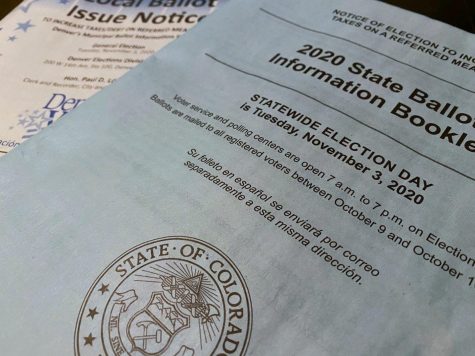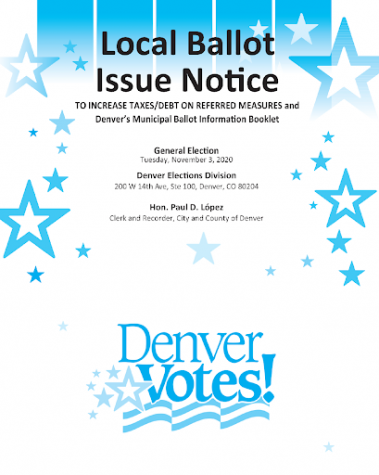Election 2020: What’s on Your Ballot?
The struggle between Republicans, Democrats, Libertarians, and so many more political parties in representation has never been more crucial than now in 2020, especially as election day is right around the corner. The drama is apparent in a heated debate between Donald Trump and Joe Biden for 4 years in the Oval Office, the chance of a change in majority in the United States Senate, and so much more on the local and municipal levels. However, there are also issues that the voters need to approve or disapprove this November that can impact our lives, from issues that will impact the whole state to even the future of Eaglecrest and the Cherry Creek School District.
Statewide Measures

Finalized on September 11, 2020, the State of Colorado 2020 State Ballot Information Booklet was established and sent out to the homes and residences of registered voters across the state. Best identified by its light blue color, it contains 11 measures that all voters within Colorado will vote on this year.
Amendments
Of the issues that will land on the ballot of all Colorado ballots this year, there are 2 different types. Amendments are proposals to amend the Colorado State Constitution by the people.
Amendment B
“Without increasing property tax rates, to help preserve funding for local districts that provide fire protection, police, ambulance, hospital, kindergarten through twelfth grade education, and other services, and to avoid automatic mill levy increases, shall there be an amendment to the Colorado constitution to repeal the requirement that the general assembly periodically change the residential assessment rate in order to maintain the statewide proportion of residential property as compared to all other taxable property valued for property tax purposes and repeal the nonresidential property tax assessment rate of twenty-nine percent?”
Excerpt from the 2020 State Ballot Information Booklet.
Amendment B is an amendment to the Colorado State Constitution that will repeal the Gallagher Amendment, another Amendment implemented in 1982 that requires the residential and nonresidential property tax revenues to make up constant portions of total statewide taxable property over time. Currently, the proportions of the taxable value of residential properties is 45%, while nonresidential is 55%. These values have not matched the ratios over time, as currently residential rate of properties is 7.15%, while nonresidential is fixed at 29%.
If the Gallagher Amendment is repealed (voting Yes on Amendment B), there is no expected decrease in the residential assessment rate, and the state legislature may choose to increase or decrease both the nonresidential and residential rates. However, if there is a planned increase, voter approval is required.
If the Gallagher Amendment is not repealed (voting No on Amendment B), nonresidential and residential rates continue as normal, with nonresidential rates remaining fixed at 29% and residential rates are expected to decrease from 7.15% in future years.
Amendment C
“Shall there be an amendment to the Colorado constitution concerning the conduct of charitable gaming activities, and, in connection therewith, allowing bingo-raffle licensees to hire managers and operators of games and reducing the required period of a charitable organization’s continuous existence before obtaining a charitable gaming license?”
Excerpt from the 2020 State Ballot Information Booklet.
Amendment C is an amendment to the Colorado State Constitution that changes rules regarding nonprofit organizations setting up bingo games and raffles, relaxing the rules of licenses by reducing the mandatory amount of years to operate in Colorado from five to three years, allows workers conducting these games to be outside hires for that organization. Also, workers will be able to receive compensation up to minimum wage.
Voting Yes on Amendment C permits these regulations to be relaxed. Voting No on Amendment C will keep current requirements that nonprofit organizations have to operate in Colorado for at least 5 years and requires workers to be unpaid volunteers that are part of that nonprofit organization.
Amendment 76
“Shall there be an amendment to the Colorado constitution requiring that to be qualified to vote at any election an individual must be a United States citizen?”
Excerpt from the 2020 State Ballot Information Booklet.
According to the Colorado State Ballot Information Booklet, Amendment 76 amends the Colorado Constitution to specify that “only a citizen” of the United States –rather than “every citizen” of the United States– is eligible to vote in Colorado elections. The amendment would prevent extending voter eligibility to noncitizens and to people under 18 years of age. However, it is unknown whether this prohibits cities and towns with a “home rule” charter, which allows cities and towns the power to make legislation relevant to their areas, from expanding voter eligibility.
Voting Yes on Amendment 76 would make sure that in order to vote in Colorado, they must be a United States Citizen and at least 18 years old. Voting No on Amendment 76 would leave no change and the possibility to extend voter eligibility to those under 18 and noncitizens remains.
Amendment 77
“Shall there be an amendment to the Colorado constitution and a change to the Colorado Revised Statutes concerning voter-approved changes to limited gaming, and, in connection therewith, allowing the voters of Central City, Black Hawk, and Cripple Creek, for their individual cities, to approve other games in addition to those currently allowed and increase a maximum single bet to any amount; and allowing gaming tax revenue to be used for support services to improve student retention and credential completion by students enrolled in community colleges?”
Excerpt from the 2020 State Ballot Information Booklet.
Amendment 77 would allow voters in the cities of Black Hawk, Central City and Cripple Creek to decide bet limits and new games in terms of gambling. Taxes collected from Casinos would expand the use for community colleges to include student retention and completion programs. Currently, the Colorado Constitution decides these regulations with approval by Colorado voters, with the previous change being in 1990.
Voting Yes on Amendment 77 would allow these gambling cities to decide their own bet limits and new games for gambling, as well as help fund community colleges. Voting No on Amendment 77 would not change any rules, and any change on bet limits and new games will be decided by Colorado voters statewide on any changes in a future election.
Propositions
Propositions on the ballot of all Colorado voters are for the approval to amend the Colorado State Statutes. There are exceptions however. One example is Proposition EE, which is listed as a “Question to Approve New Taxes.” There is also Proposition 113, listed as a “Referendum Petition on Whether to Approve a Bill Passed by the State Legislature in 2019”, according to the Colorado 2020 State Ballot Information Packet.
Proposition EE
“Shall state taxes be increased by $294,000,000 annually by imposing a tax on nicotine liquids used in e-cigarettes and other vaping products that is equal to the total state tax on tobacco products when fully phased in, incrementally increasing the tobacco products tax by up to 22% of the manufacturer’s list price, incrementally increasing the cigarette tax by up to 9 cents per cigarette, expanding the existing cigarette and tobacco taxes to apply to sales to consumers from outside of the state, establishing a minimum tax for moist snuff tobacco products, creating an inventory tax that applies for future cigarette tax increases, and initially using the tax revenue primarily for public school funding to help offset revenue that has been lost as a result of the economic impacts related to COVID-19 and then for programs that reduce the use of tobacco and nicotine products, enhance the voluntary Colorado preschool program and make it widely available for free, and maintain the funding for programs that currently receive revenue from tobacco taxes, with the state keeping and spending all of the new tax revenue as a voter-approved revenue change?”
Excerpt from the 2020 State Ballot Information Booklet.
Proposition EE will increase taxes on cigarettes and tobacco products, as well as creating a new tax on nicotine products that includes vapes. The revenue will be spent on education, housing, tobacco prevention, health care, and preschool. Cigarettes are currently taxed at 4.2 cents per cigarette, or 84 cents per pack of 20 cigarettes. Proposition EE will increase that to $2.64 per pack of 20 cigarettes by 2027, an increase of $1.80. Tobacco products such as chewing tobacco, cigars, and snuff are taxed at 40% of the manufacturer’s price. This will increase to 62% by 2027. Nicotine products such as vaping products are not subject to any taxes except state sales tax. Nicotine products will be taxed by 62% by the year 2027.
Voting Yes on Proposition EE will place these taxes into place in Colorado. Voting No will have current regulations stay the same.
Proposition 113
“Shall the following Act of the General Assembly be approved: An Act concerning adoption of an agreement among the states to elect the President of the United States by national popular vote, being Senate Bill No. 19-042?”
Excerpt from the 2020 State Ballot Information Booklet.
To what some may consider one of the most controversial on the ballot, Proposition 113 is an approval of Senate Bill No. 19-042, passed by the state legislature and signed by the governor for voter approval. It enters Colorado into the National Popular Vote Interstate Compact, which is an agreement among participating states along with the District of Columbia to ensure that the presidential candidate who wins the most votes nationwide (the popular vote) is elected president. States in this agreement award all of their state’s electoral votes to the candidate who receives the most popular votes nationally. Colorado would be the 15th state in this agreement if the proposition is passed. However, the committed electoral votes with Colorado is 196, and 270 is required for this agreement to go into effect.
Voting Yes on Proposition 113 would enter Colorado into this compact. Voting No would reject the bill and the current system would remain, in which Colorado awards all electors for President of the United States to the winner of the Colorado popular vote. Colorado currently has 9 delegates in the Electoral College.
Proposition 114
“Shall there be a change to the Colorado Revised Statutes concerning the restoration of gray wolves through their reintroduction on designated lands in Colorado located west of the continental divide, and, in connection therewith, requiring the Colorado parks and wildlife commission, after holding statewide hearings and using scientific data, to implement a plan to restore and manage gray wolves; prohibiting the commission from imposing any land, water, or resource use restrictions on private landowners to further the plan; and requiring the commission to fairly compensate owners for losses of livestock caused by gray wolves?”
Excerpt from the 2020 State Ballot Information Booklet.
Proposition 114 would approve a plan to reintroduce gray wolves, a keystone species in many ecosystems, into the Colorado wilderness and manage them by December 31, 2023, as well as pay fair compensation for livestock losses caused by gray wolves. Management of gray wolves will be managed by the United States Fish and Wildlife Service, as they are classified at the federal level as an endangered species since 1978, and Colorado will assume the management if gray wolves are removed as an endangered species. The USFWS had removed gray wolves off the endangered species list in 2011 for the Northern Rocky Mountains, which includes Idaho, Montana and Wyoming which now manage gray wolves within their states. They also proposed in 2019 to remove gray wolves from the endangered species list in the rest of the United States, which would include Colorado. Costs will be paid primarily from hunting and fishing license fees or appropriations made by the state legislature.
Voting Yes on Proposition 114 will enact the plan to reintroduce wolves, while voting No on Proposition 114 will not reintroduce gray wolves to Colorado.
Proposition 115
“Shall there be a change to the Colorado Revised Statutes concerning prohibiting an abortion when the probable gestational age of the fetus is at least twenty-two weeks, and, in connection therewith, making it a misdemeanor punishable by a fine to perform or attempt to perform a prohibited abortion, except when the abortion is immediately required to save the life of the pregnant woman when her life is physically threatened, but not solely by a psychological or emotional condition; defining terms related to the measure including “probable gestational age” and “abortion,” and excepting from the definition of “abortion” medical procedures relating to miscarriage or ectopic pregnancy; specifying that a woman on whom an abortion is performed may not be charged with a crime in relation to a prohibited abortion; and requiring the Colorado medical board to suspend for at least three years the license of a licensee whom the board finds performed or attempted to perform a prohibited abortion?”
Excerpt from the 2020 State Ballot Information Booklet.
Another issue that some consider controversial on this year’s ballot in Colorado is Proposition 115. Proposition 115 will prohibit abortion after 22 weeks gestational age of the fetus, except when an abortion is required to save the life of a pregnant woman. A criminal penalty will be created for anyone who performs a prohibited abortion and require the state to suspend the medical license of a physician who violates the measure for at least three years.
Voting Yes on Proposition 115 will set these regulations into place. Voting No on Proposition 115 will remain current regulations as abortion is legal at any time during a pregnancy in Colorado.
Proposition 116
“Shall there be a change to the Colorado Revised Statutes reducing the state income tax rate from 4.63% to 4.55%?”
Excerpt from the 2020 State Ballot Information Booklet.
Proposition 116 is one of the shortest issues on the ballot in terms of length. Proposition 116 shall reduce the state income tax rate from 4.63% to 4.55%. According to the 2020 State Ballot Information Booklet, the arguments for the proposition is extra money for the taxpayers as the state revenue is expected to increase, and arguments against it is that the state budget had to make significant budget cuts this year, and that 75% of taxpayers will receive a cut of less than $50 dollars per year.
Voting Yes on Proposition 116 will lower the state income tax rate to 4.55%, and voting No on Proposition 116 will have the state income tax rate remain at the current 4.63%.
Proposition 117
“Shall there be a change to the Colorado Revised Statutes requiring statewide voter approval at the next even-year election of any newly created or qualified state enterprise that is exempt from the Taxpayer’s Bill of Rights, Article X, Section 20 of the Colorado constitution, if the projected or actual combined revenue from fees and surcharges of the enterprise, and all other enterprises created within the last five years that serve primarily the same purpose, is greater than $100 million within the first five fiscal years of the creation or qualification of the new enterprise?”
Excerpt from the 2020 State Ballot Information Booklet.
The issue of Proposition 117 amends the Colorado statutes to require voter approval for new state government-owned businesses if the revenue from fees over it’s first five years is over $100 million and asks voters with specific language included on the ballot to improve those businesses, known as “enterprises.” Examples of organizations that are classified as “enterprises” include the Colorado Lottery and Colorado Parks and Wildlife. Enterprises charge user fees in exchange for services provided, such as the Colorado Lotto and entry into state parks including Cherry Creek State Park. Arguments for the proposition include strengthening the role of citizens in determining the size of government, while arguments against the proposition say it would be forcing the state to pay for critical services with tax revenue rather than through user fees.
Proposition 118
“Shall there be a change to the Colorado Revised Statutes concerning the creation of a paid family and medical leave program in Colorado, and, in connection therewith, authorizing paid family and medical leave for a covered employee who has a serious health condition, is caring for a new child or for a family member with a serious health condition, or has a need for leave related to a family member’s military deployment or for safe leave; establishing a maximum of 12 weeks of family and medical leave, with an additional 4 weeks for pregnancy or childbirth complications, with a cap on the weekly benefit amount; requiring job protection for and prohibiting retaliation against an employee who takes paid family and medical leave; allowing a local government to opt out of the program; permitting employees of such a local government and self-employed individuals to participate in the program; exempting employers who offer an approved private paid family and medical leave plan; to pay for the program, requiring a premium of 0.9% of each employee’s wages, up to a cap, through December 31, 2024, and as set thereafter, up to 1.2% of each employee’s wages, by the director of the division of family and medical leave insurance; authorizing an employer to deduct up to 50% of the premium amount from an employee’s wages and requiring the employer to pay the remainder of the premium, with an exemption for employers with fewer than 10 employees; creating the division of family and medical leave insurance as an enterprise within the department of labor and employment to administer the program; and establishing an enforcement and appeals process for retaliation and denied claims?”
Excerpt from the 2020 State Ballot Information Booklet.
Proposition 118 is another highly debated issue through the creation of a Paid Family and Medical Leave Insurance Program. This program requires employers and employees to pay a payroll premium to finance paid family and medical leave starting on January 1, 2023, and eligible employees can be given up to 12 weeks of paid family and medical leave starting on January 1, 2024. This program also creates job protections for those who take paid family or medical leave. Some argue that the program will have a positive impact not only on the health of Colorado families, but also the economy through the increase of employment opportunities, while others argue that the program creates a financial and regulatory burden on employers and requires employees to pay even if they are not using it.
Local Measures

Here at Eaglecrest, most, if not all, students at Eaglecrest reside within Arapahoe County. Within the area of Eaglecrest, there are only two measures to be voted on locally.
Cherry Creek School District Issues #4A and #4B
4A: “In order to make more general fund revenues available for teacher compensation, maintaining class sizes, maintaining and adding mental health professionals and nurses to support students, and providing for the security and safety of students and staff, shall Cherry Creek School District No. 5 taxes be increased up to $35 million in tax collection year 2021, with such amount being adjusted annually thereafter by the percentage change in inflation, by levying a property tax and a rate sufficient to generate such amount; pursuant to Section 22-54-108.7 C.R.S., shall such additional revenues be utilized for ongoing cash funding for capital construction, new instructional technology, existing technology upgrades, and maintenance needs of the district; and shall the district be authorized to collect, retain and spend all revenues of the district as a voter approved revenue change and an exception to the limits that would otherwise apply under Article X, Section 20 of the Colorado Constitution or any other law?”
4B: “Without imposing any new tax, shall Cherry Creek School District No. 5 debt be increased $150 million, with a maximum total repayment cost of not more than $293 million for the purposes of: constructing a mental health day treatment facility to support mental health needs of students; acquiring technology to support remote/online learning for all students including lower income students; providing safety improvements at school buildings, including deadbolt locks and cameras; acquiring, constructing, repairing, renovating and equipping school buildings and other school facilities to manage student growth; and providing other district capital improvements; and shall the taxes authorized at the district’s bond elections in 2003, 2008, 2012, and 2016 be extended and authorized to be used to pay the debt authorized at this election in addition to the debt authorized at such prior elections; and shall the mill levy be increased in any year, without limitation of rate but only in an amount sufficient to pay the principal of, premium, if any, and interest on such debt or any refunding debt (or to create a reserve for such payment); and may such debt be evidenced by the issuance of general obligation bonds or other multiple fiscal year obligations to be sold in one series or more, for a price above or below the principal amount thereof, on terms and conditions, and with such maturities as permitted by law and as the district may determine?”
Excerpts from the Arapahoe County Notice of Election Analysis of the 2020 Ballot Proposals.
These two issues are the ones that impact us directly here at Eaglecrest. The Cherry Creek School District is proposing to voters on Issue #4A to increase taxes by $35 million in order to improve and maintain the needs of the district. On the Arapahoe County Notice of Election, Cherry Creek argues that Yes on 4A means to:
- Retain and recruit high-quality teachers.
- Maintain registered nurses in every school.
- Maintain mental health staffing.
- Keep class sizes small.
- Keep CCSD schools competitive with metro area schools.
- Support strong property values.
- Invest in Jobs to support a strong economy in CCSD communities.
Issue #4B is a $150 million bond measure to become debt for what Cherry Creek argues on the Arapahoe County Notice of Election that Yes on 4B includes:
- A mental health/day treatment center for CCSD students.
- New safety systems for schools including intercoms and push-button deadbolt locks.
- Camera and fire system upgrades throughout CCSD schools.
- Funding for every high school to create innovative environments.
- Expanded programming options for in-demand careers that will drive Colorado’s economy.
- Expanded nursing and mental health certification programs.
- A new elementary school on the east side of CCSD to alleviate overcrowding.
According to the district, the planned future elementary school will be located directly south of Altitude Elementary School and will be zoned to go to Fox Ridge Middle School and Cherokee Trail High School. Also, through Issue #4B the district will be able to use the taxes authorized of approved bond elections in 2003, 2008, 2012, and 2016 to be used to pay the debt accumulated from this election.
The importance of these measures, despite the lengthy context, matter significantly and impact everyone at so many aspects for all of us Coloradans, or as Raptors here at Eaglecrest that’ll benefit or harm our daily lives. And though these measures are only just a sample of what is on the 2020 Ballot, as there are also many candidates for office up for election that represent us as constituents, becoming informed is ever more important as November 3rd draws closer and closer.
For more information regarding the issues discussed, please view the Colorado 2020 State Ballot Information Packet and the Arapahoe County Notice of Election Analysis of the 2020 Ballot Proposals located at these websites below:
https://www.arapahoevotes.com/sites/default/files/2020-10/FINAL_Tabor%20Notice%202020.pdf

Edmond Kunath is returning to Nest Network for his third year, having previously worked with the Eagle Quill. Edmond is the Advertising Manager, and with...





